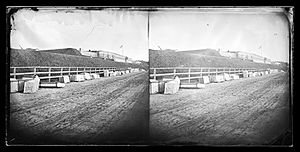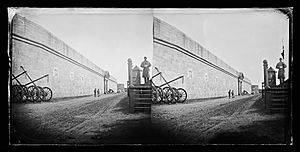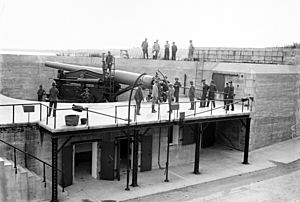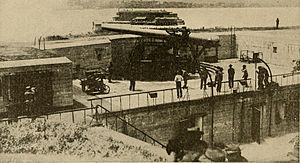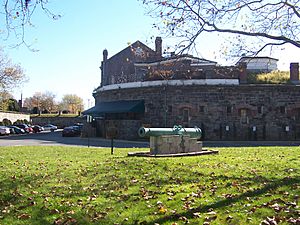Fort Hamilton facts for kids
Quick facts for kids Fort Hamilton |
|
|---|---|
| Part of Harbor Defenses of Southern New York | |
| New York City borough of Brooklyn, New York | |
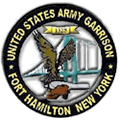
Fort Hamilton Seal
|
|
| Coordinates | 40°36′22″N 74°01′51″W / 40.60611°N 74.03083°W |
| Site information | |
| Controlled by | United States Army |
| Open to the public |
partly |
| Condition | partly demolished, remainder occupied |
| Site history | |
| Built | 1825–1831 |
| Built by | Simon Bernard |
| In use | 1825–present |
| Garrison information | |
| Current commander |
COL Brian A. Jacobs |
| Past commanders |
Major Benjamin Kendrick Pierce Captain Abner Doubleday Captain Robert E. Lee (post engineer) |
| Garrison | Brooklyn, New York |
Fort Hamilton is a United States Army base located in Brooklyn, New York City. It is surrounded by the neighborhoods of Bay Ridge and Dyker Heights. This base helps provide support for the Army National Guard and the United States Army Reserve in the New York metropolitan area.
The original fort was finished in 1831. Major additions were made in the 1870s and 1900s. Today, most of the old defenses are gone or buried. Only about half of the original fort remains.
A Look Back: Fort Hamilton's History
Early Days and the American Revolution
The land where Fort Hamilton stands has been used for military purposes for a long time. On July 4, 1776, a small American battery, called the Narrows Fort, fired at a British warship. This ship was part of a fleet bringing troops to stop the American Revolution. The British ship, HMS Asia, was damaged, but the American forces were too small to stop the huge fleet. This event was still very important as one of the first times the site was used militarily.
Building the Fort: A Stronger Defense
The War of 1812 showed how important it was to protect the coast. The British even burned parts of Washington, D.C. This led to building new forts, including Fort Hamilton. These new forts were part of what was called the "third system of US seacoast forts."
The first stone for Fort Hamilton was laid on June 11, 1825. The fort was designed by Simon Bernard, a French military engineer who had worked for Napoleon. He joined the U.S. Army in 1815. Six years and half a million dollars later, the fort was ready. Its first soldiers were from the 4th U.S. Artillery.
Fort Hamilton was mainly built to defend Fort Lafayette, which was located offshore. Fort Lafayette was later torn down in the 1960s to make way for the Verrazzano-Narrows Bridge. Fort Hamilton was shaped like a trapezoid. It had two levels of cannons and holes for muskets on its land-facing sides. A dry ditch also protected these sides.
The fort was officially named Fort Hamilton in the 20th century. It was named after Alexander Hamilton, a famous general and the first Secretary of the Treasury. In 1839, the fort became the nation's first National Guard training camp.
Famous Leaders at the Fort
Several important military leaders served at Fort Hamilton. Captain Robert E. Lee, who later became a famous general in the Civil War, worked on improving the fort's defenses from 1841 to 1846. Lieutenant Stonewall Jackson, another Civil War general, also served here. Captain Abner Doubleday, who is sometimes credited with inventing baseball, was the fort's commander in 1861. This was shortly after he served at Fort Sumter, where the Civil War began.
Fort Hamilton During the Civil War
During the American Civil War, more soldiers were stationed at Fort Hamilton. A barrier of ships was placed across the Narrows. This helped Fort Hamilton and its sister forts on Staten Island, now called Fort Wadsworth, protect the harbor from Confederate ships. The forts also sent troops to help stop the New York Draft Riots in 1863. Fort Hamilton was also used as a prisoner-of-war camp.
New types of cannons, called rifled cannon, made the old stone forts less effective. So, new batteries were built with guns in open positions behind low earth walls. In 1871, construction began on new gun batteries at Fort Hamilton.
Modernizing Defenses: The Endicott Program
In 1885, a group called the Endicott Board suggested big improvements to U.S. coastal defenses. They recommended new, modern guns. This led to major changes at Fort Hamilton. More than half of the old fort was taken down to build new concrete gun batteries. Fort Hamilton became part of the defense system for New York.
Many new gun batteries were completed at Fort Hamilton between 1898 and 1905. These included batteries with large 12-inch and 10-inch guns, some of which could disappear into their mounts after firing. There were also smaller 6-inch and 3-inch guns. Some of these guns were quickly added after the Spanish–American War began in 1898.
World War I and Beyond
When the U.S. entered World War I, Fort Hamilton became a busy training center. Many new soldiers came here before going overseas. Some of Fort Hamilton's large guns were taken apart to potentially be used on the battlefields in Europe. However, very few U.S. Army coastal artillery weapons were actually used in that war.
After World War I, more changes happened. Some of Fort Hamilton's guns were removed. By the 1920s, newer, more powerful guns were installed at other forts nearby, like Fort Hancock, New Jersey and Fort Tilden. This meant Fort Hamilton became a "second line" of defense for New York.
World War II and After
During World War II, Fort Hamilton mainly served as a place where soldiers gathered before being sent to other locations. Most of the remaining older guns were gradually removed. Newer, very large 16-inch guns at other forts took over the main defense role. An anti-aircraft battery was also at Fort Hamilton during the war to protect against air attacks.
After World War II, it was decided that gun coastal defenses were no longer needed. In 1948, the last coastal defense gun was removed from Fort Hamilton. In the 1950s and 1960s, many of the old gun batteries were torn down or buried. This happened to make room for the Verrazzano-Narrows Bridge and the Belt Parkway.
Fort Hamilton Today
Fort Hamilton is the only active military base in New York City. It was once a "sister fort" to Fort Wadsworth on Staten Island. Both were part of a larger system of military bases in New York City.
Today, Fort Hamilton is home to several important military units. These include the New York City Recruiting Battalion and the Military Entrance Processing Station. It also hosts the North Atlantic Division Headquarters of the United States Army Corps of Engineers. Many Army Reserve and New York Army National Guard units are also supported here.
The building of the Verrazzano-Narrows Bridge in the 1960s led to the loss of some historic structures, like Fort Lafayette. However, efforts to save the history of the Narrows area increased. The Harbor Defense Museum at Fort Hamilton helps preserve this history.
The original fort building now houses the Community Club. The caponier, a small fort that guarded the main gate, is now home to the Harbor Defense Museum. Other important historical places include the Robert E. Lee House, where Robert E. Lee lived, and Colonels' Row, which are historic townhouses. All these buildings are listed on the National Register of Historic Places.
In the 2000s, the historic parade field was developed into new housing. However, the historic flagpole and a cannon are still there.
A very large 20-inch Rodman gun from the Civil War era is displayed in John Paul Jones Park just north of the fort. It is one of only two remaining and was the largest gun made by either side during that period. An old Navy 12-inch gun is also displayed on the base.
Fort Hamilton in Pop Culture
Fort Hamilton has appeared in several books and TV shows:
- In Marvel Comics' G.I. Joe (1982), Cobra prisoners are taken to the stockade at Fort Hamilton.
- It is featured in the TV show Law and Order: Special Victims Unit season 19, episode 18, called "Service."
- Fort Hamilton is the main setting for Nelson DeMille's novel, Word of Honor.
- In the movie The Lords of Flatbush, a character's father is an Army officer assigned to Fort Hamilton.





